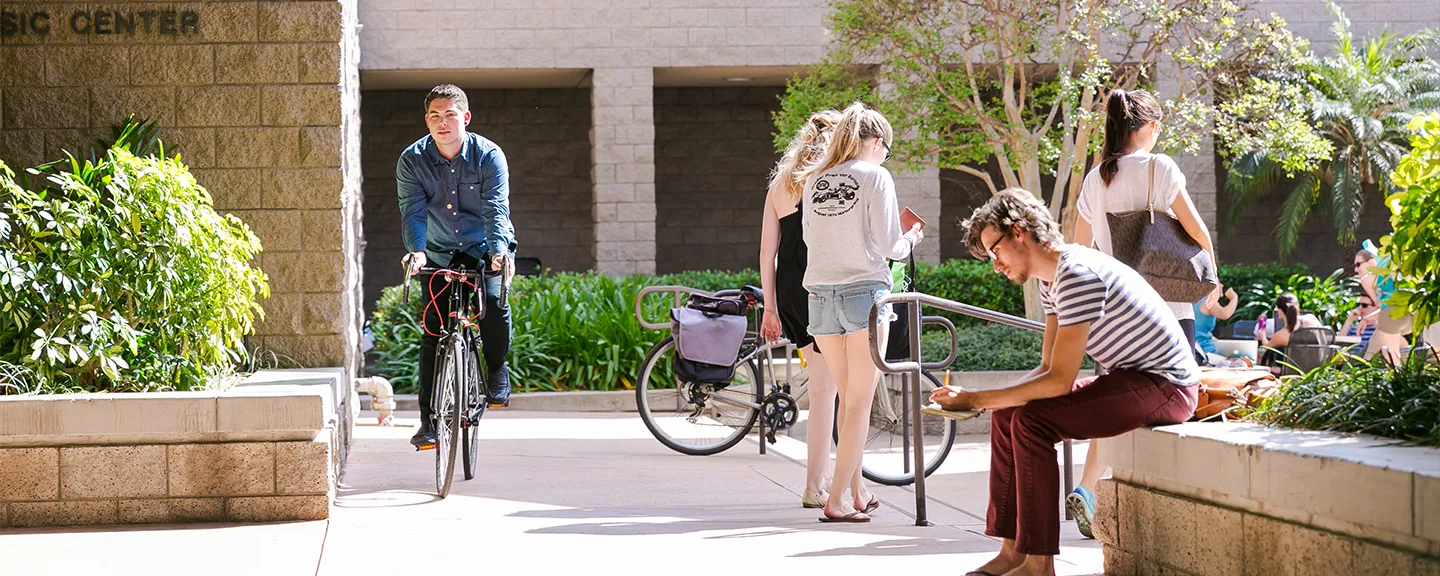- Home
- >
- APU Articles
- >
- News Article
In-Person Classes Are Back: Here’s How You Can Thrive
August 31, 2021 | Written By Ben Kissam

“Most students have likely constructed some sense of a ‘normal’ routine over the past year,” said Bill Fiala, PhD, ABPP, dean of wellness at APU. “Students coming back to campus should anticipate that they will need to construct a new routine, which could take a little time to get used to.”
A little preparation and knowledge of resources can go a long way. Here’s how you can succeed at APU this fall.
Visualize and Write It Down
If you really want to hit the ground running, try practicing visualization and writing your routine out on paper.
Visualization is a powerful performance-enhancing tool that only takes a few minutes each day and can help ensure you achieve your goals. Mentally walk yourself through the day ahead; imagine what might happen—both the good and the bad. Then, take time to consciously identify how you might respond to those things.
“Going back to in-person meeting times is an adjustment for everyone. Keeping an organized schedule and time management is key,” said Stephanie Gala, director of APU’s Academic Success Center. “Using scheduling tools and calendars, such as Google Calendar, will help you stay organized.”
Once you’ve mentally mapped out your day, write it down on a piece of paper. That may make all the difference, as studies show you’re far more likely to achieve your goals when you write them down.
Invest in Your Health
Switching from a sedentary, pajama-garbed education to a full-blown, in-person experience on campus can be a shock to the system, or at least to your overall stamina and energy. So it’s essential to remain vigilant about your health, as it can greatly ease the adjustment. This includes healthy habits like:
- Exercising regularly
- Eating healthy and maintaining portion control
- Getting plenty of sleep
- Praying consistently
“Recognize that in-person interactions require a different kind of energy,” noted Fiala, “so be patient with yourself if you are feeling a bit tired or drained at first.”
Apply that same patience to your personal comfort levels. Don’t force yourself back into a strenuous workout routine if you aren’t ready for that yet. Instead, map out a few running or walking routes around campus, or invest in some lightweight gym equipment, including resistance bands or a jump rope, so you can break a sweat inside or outside your dorm.
Socialize at Your Speed
After more than a year of social distancing, many students are incredibly eager to reconnect with old friends and make new ones, and the APU campus and classrooms offer an ideal environment for that. “We are built for community,” Fiala noted, “so take advantage of the many opportunities you will have to make connections with others once you do return to campus.”
At the same time, he recognizes it won’t be easy to simply flick the socialization switch from off to on and that returning to in-person social interactions may be an adjustment. “Students might feel out of practice connecting with one another in person and will need to extend grace to each other as they create a sense of belonging and connection on campus.”
Nevertheless, make every effort to nurture your social side, as surrounding yourself with good people is key to well-being and happiness, as well as educational success.
“Everyone needs to be gracious and understanding with each other and themselves,” said Gala. “There is no one right way to transition back from the experience we all have had. The APU community is ready to receive you and support you.”
Take Advantage of On-Campus Resources
Returning to in-person classes also comes with greater access to a wealth of resources and services on campus that can help you readjust to in-person learning.
Those services include:
- Free teletherapy sessions at the Counseling Center
- Academic support, including advising, tutoring, and more, through the Academic Success Center
- Spiritual support and opportunities through the Office of Spiritual Life
The Counseling Center offers COVID-19-specific support, including a number of groups and workshops targeting student wellness and anxiety management.
Want to learn more about transitioning back to campus well? Check out the Health Center page..